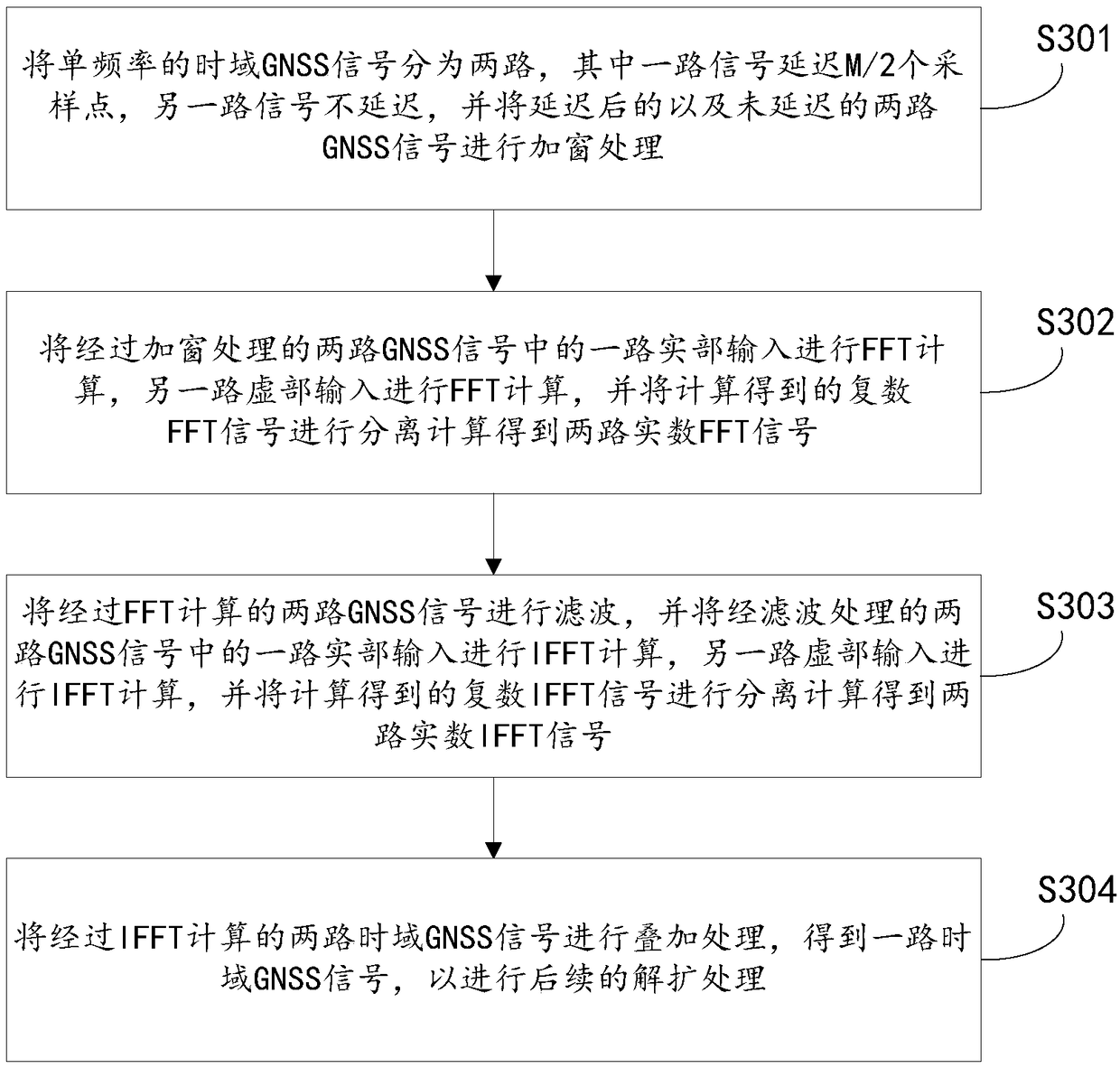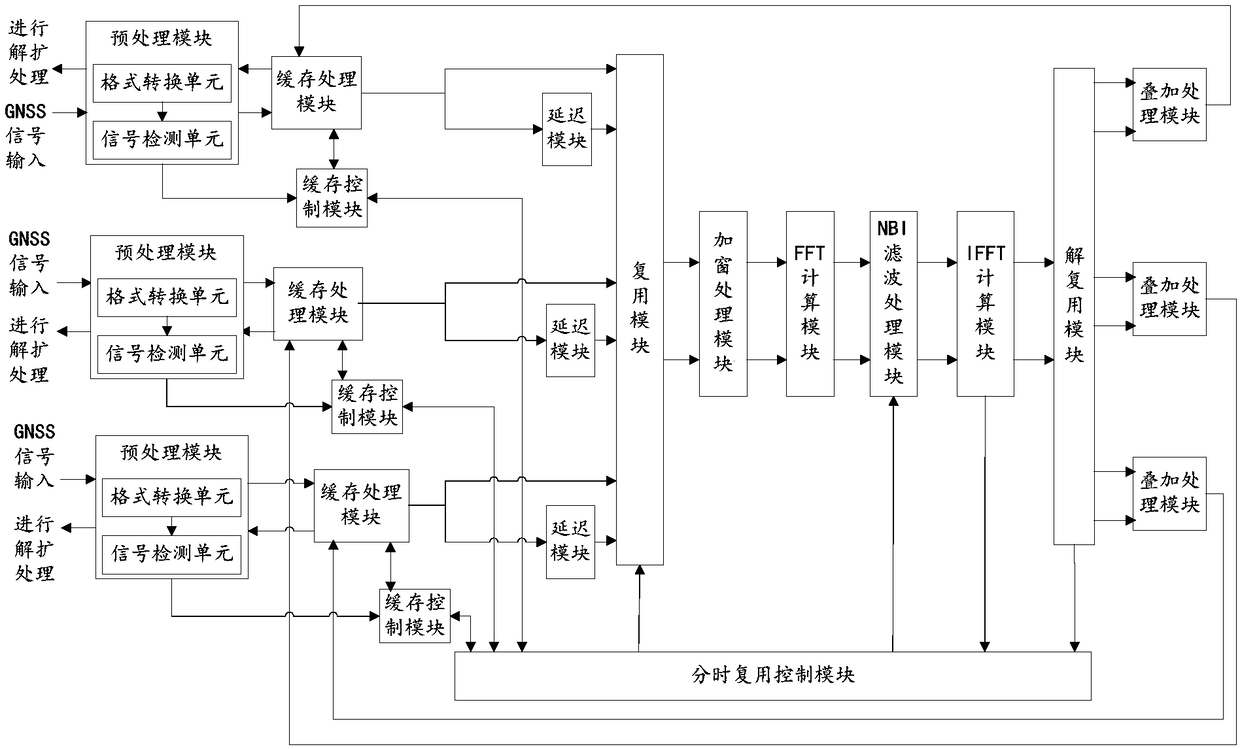Single-frequency and multi-frequency GNSS signal narrow-band interference suppression devices, systems and methods
A narrow-band interference and suppression device technology, which is applied in the field of satellite navigation digital signal processing, can solve problems such as large signal attenuation, output signal signal-to-noise ratio loss, and spectrum leakage, and achieve hardware cost reduction, independence, and narrow-band interference suppression. Effect
- Summary
- Abstract
- Description
- Claims
- Application Information
AI Technical Summary
Problems solved by technology
Method used
Image
Examples
Embodiment 1
[0044] Embodiment 1. A single-frequency GNSS signal narrowband interference suppression device. Combine below figure 1 The device provided in this embodiment will be described in detail.
[0045] see figure 1 , The device provided in this embodiment includes a delay module, a windowing processing module, an FFT calculation module, an NBI filter processing module, an IFFT calculation module, and a superposition processing module.
[0046] The delay module is used to receive one GNSS signal, and delay it by M / 2 sampling points and output it to the windowing processing module, where M is the length of an FFT block, specifically an exponent power of 2.
[0047] The windowing processing module is used to receive one GNSS signal and the GNSS signal delayed by M / 2 sampling points sent by the delay module, and perform windowing processing on the two time domain GNSS signals respectively.
[0048] Specifically, the windowing processing module is used to receive one GNSS signal, and ...
Embodiment 2
[0056] Embodiment 2. A method for suppressing narrow-band interference of single-frequency GNSS signals. Combine below figure 2 The method provided in this embodiment will be described in detail.
[0057] see figure 1 and figure 2 , S301. Divide the single-frequency time-domain GNSS signal into two paths, wherein one path signal is delayed by M / 2 sampling points, and the other path signal is not delayed, and the delayed and undelayed two-path GNSS signals are respectively windowed deal with.
[0058] Specifically, the single-frequency time-domain GNSS signal is divided into two paths, and the delay module receives one of the signals and delays it by M / 2 sampling points, and sends the delayed GNSS signal to the windowing processing module, so The windowing processing module receives another GNSS signal and the delayed GNSS signal of M / 2 sampling points sent by the delay module, and multiplies it by the same windowing coefficient obtained by searching in the windowing functi...
Embodiment 3
[0064] Embodiment 3, a multi-frequency GNSS signal narrowband interference suppression system. Combine below figure 1 as well as image 3 The system provided in this embodiment will be described in detail.
[0065] see figure 1 and image 3 , the system provided by this embodiment includes a single-frequency GNSS signal narrowband interference suppression device and at least one preprocessing module, at least one cache processing module, at least one cache control module, multiplexing module, demultiplexing module and time division multiplexing control module .
[0066] The preprocessing module includes a format conversion unit and a signal detection unit for receiving unprocessed GNSS signals, and the format conversion unit converts GNSS signals of different bit widths and different encoding formats into the same GNSS signal in the RF clock domain Bit width and encoding format, the signal detection unit performs interference signal detection on the format-converted GNSS ...
PUM
 Login to View More
Login to View More Abstract
Description
Claims
Application Information
 Login to View More
Login to View More - R&D
- Intellectual Property
- Life Sciences
- Materials
- Tech Scout
- Unparalleled Data Quality
- Higher Quality Content
- 60% Fewer Hallucinations
Browse by: Latest US Patents, China's latest patents, Technical Efficacy Thesaurus, Application Domain, Technology Topic, Popular Technical Reports.
© 2025 PatSnap. All rights reserved.Legal|Privacy policy|Modern Slavery Act Transparency Statement|Sitemap|About US| Contact US: help@patsnap.com



